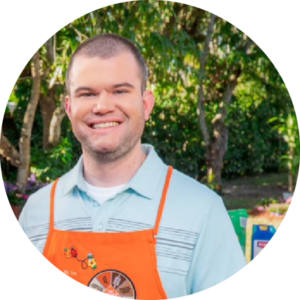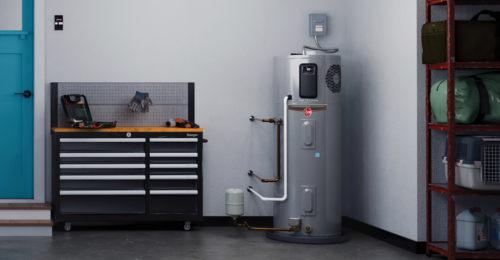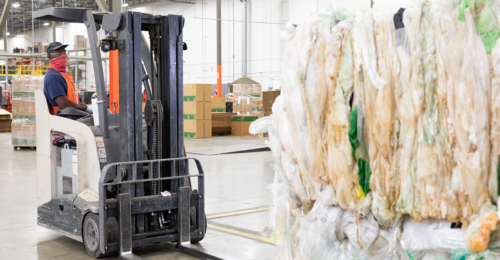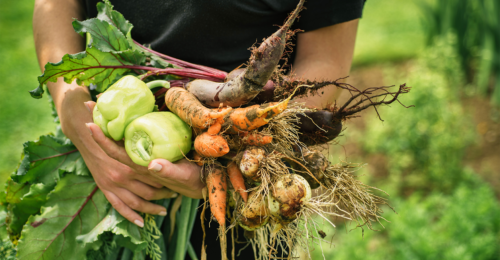 What flour is to baking, soil is to growing. And good gardeners are particular about their soil. They care as much about what’s not in it as what is.
What flour is to baking, soil is to growing. And good gardeners are particular about their soil. They care as much about what’s not in it as what is.
After all, growing is a process, and as with baking, there’s more than one way to bake a cake. One person who knows the ins and outs of soils better than anyone is Mike Swanson, The Home Depot’s Merchant of Soils and Mulch. Mike recently sat down with us to discuss his role, the importance of using the right soil and the innovations we can expect to see in The Home Depot’s Garden Center this spring.
EA: Welcome to Eco Actions, Mike. As we speak, it’s early spring in the Southeast. What does that mean for the Outside Garden team and especially for the person in charge of soils and mulch?
MS: This time of year, we are in the stores almost every day. With soils and mulch in particular, almost 70% of my business is sold within the spring time frame. We see sales skyrocket during spring break. Typically, everyone comes in at once to start their garden. Though, lately, we’re starting to see that peak come a little earlier because spring is starting earlier in some places. It’s certainly true here in the Southern division.
When the weather changes, we move tens of millions of bags of soils and mulch in a very short time frame. With that much happening, we have to be there in the store where we can interact with customers, checking to see that our pricing is competitive and making sure that inventory is flowing correctly into the stores.
EA: How does seasonality differ in Outside Garden from other departments, and how can a company as big as The Home Depot remain responsive to changing weather patterns?
MS: Not all seasonal departments are alike. Christmas and Halloween happen every year, but that’s not the case for spring. Spring doesn’t always happen. In fact, last year was our worst spring on record because it was so cold and wet across the United States. It was still snowing up North through the end of April. Only very serious gardeners are going to plant in weather like that.
We are intentional about working with the weather rather than against it. The first thing I do every day is wake up and check weather.com. I’m watching key markets in case the weather shifts because I want to make sure that stores have the right amount of product. If we are expecting an area to be rainy and cold, but it turns sunny, then those stores will need more product for the weekend.
EA: When gardeners come into The Home Depot to begin their spring planting, where do they start? How important are soils and mulch to those garden projects?
MS: For the most part, soils and fertilizer lead the season. Depending on the weather, fertilizer may be a smidge ahead of soils. But when you consider that soils are essential to any flowers or vegetables that you plant, we want to make sure that we have soils available to support those plants.
I always make the analogy that soil is like cake mix – you need the right cake mix to keep your flowers and vegetables alive. Soil is packaged for a variety of uses. There’s garden soil, potting mix and raised bed soil. Each is designed for the area and type of use, so picking the right one is important to the success of your planting.
Generally speaking, mulch comes last and after everything is planted. Then you lay down mulch as a moisture-control agent. The wood in mulch helps to absorb rain and moisture so that flowers and plants don’t dry up. Mulch also helps control the moisture in the soil.
EA: When you spend time with shoppers, what are their biggest concerns? How important is sustainability to the DIY gardener?
MS: By far the biggest issue for most customers is keeping their flowers and vegetables alive. They are thinking more immediately about the survival of their plants. They don’t want their flowers or vegetables to die, and neither do we!
Shoppers who are thinking about sustainability on a bigger scale are more likely to purchase organic soils.
EA: What are the advantages of organic product over traditional soils?
MS: The difference between organic soil and traditional soil is the additives, which we call amendments, such as perlite and vermiculite. Traditional soils include additives. You’ve probably seen those little white beads in some soils. Those are additives, and they make growing easy, but they are less healthy for the ground long-term.
Organic soil, on the other hand, has no additives. It’s made from wood chips and is naturally moist and loose, which aid growing. The organic soil is better for the ground as well. You do have to monitor it more closely to make sure that the wood is degrading, and sometimes you need to add a little bit of perlite or peat moss to the organic soil just to help it.
Organic soils require more care and availability of ingredients. But they are often a great value, and they are the healthier option for the ground.
EA: What innovations are you seeing on the horizon that garden enthusiasts can anticipate?
MS: We’re always thinking about improving the soils that we sell and the additives that are in there. We’re always trying to make the right cake mix so that flowers and vegetables stay alive longer, grow faster and provide that great experience. We’re always testing and learning with mixes within the soil.
Long-term, we want to make sure we’re staying ahead of trends while also being cognizant of what this means for your ground.
EA: When it comes to the assortment of soils and mulch that spring gardeners have to choose from, are there any products you’d like to highlight?
MS: Definitely. I think Earthgro mulch from Scotts Miracle-Gro is a fantastic product. Made from forest products, Earthgro Mulch helps conserve soil moisture, moderate soil temperature and prevent weeds naturally by blocking growth and access to sunlight.
EA: Is there anything else you want people to know about soils and mulch?
MS: It goes back to everything I was talking about at the beginning of the conversation. Within soils and mulch, it’s so important to understand the type of use for your plants and vegetables. It really comes down to making sure you have that right cake mix for your live goods so they can flourish.
I like to encourage people to think long-term about how they can improve their garden, and how their garden can improve the overall experience of their home. Get creative with your outdoor garden, and when you have questions, let us know. Getting outside is something fun to look forward to every spring.






